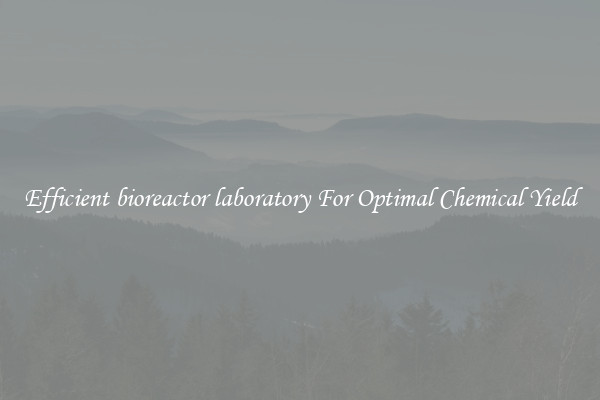Efficient bioreactor laboratory For Optimal Chemical Yield
Efficient bioreactor laboratory for optimal chemical yield

In the field of chemical engineering, bioreactors play a crucial role in the production of various chemicals and pharmaceuticals. These large-scale vessels are specially designed to provide an ideal environment for growing and cultivating microorganisms or cells that produce the desired chemical compounds. To ensure optimal chemical yield, it is essential to have an efficient bioreactor laboratory that incorporates advanced technology and best practices.
One key aspect of an efficient bioreactor laboratory is automation. By automating various processes such as feeding, pH control, temperature regulation, and sampling, researchers can minimize human error and improve productivity. Advanced bioreactor systems use sensors and software to continuously monitor and adjust these parameters, ensuring optimal conditions for chemical production. Automated bioreactors also allow for remote monitoring and control, reducing the need for constant physical presence in the laboratory.
Another crucial factor is the use of robust and well-defined culture systems. In order to achieve high chemical yields, the bioreactor laboratory should have well-characterized cell lines or microorganisms that are known to produce the desired compounds efficiently. This may involve genetic engineering or strain selection to enhance the productivity of the cells. Additionally, researchers should optimize the culture medium and conditions to provide the necessary nutrients and growth factors for the microorganisms.
Efficient bioreactor laboratory design is also essential for optimal chemical yield. The laboratory should have controlled environments to maintain process stability and prevent contamination. This may include air filtration systems, sterile work areas, and regular cleaning and maintenance protocols. The bioreactors themselves should have appropriate agitation and aeration systems to ensure proper mixing and oxygen supply to the microorganisms.
Furthermore, scalability is a critical consideration for an efficient bioreactor laboratory. Researchers often need to scale up their processes from lab-scale to industrial-scale production. Therefore, the laboratory should be equipped with bioreactors that mimic the conditions and parameters of the industrial-scale reactors. This allows for seamless transition and ensures that the optimal chemical yield achieved at the laboratory level can be replicated on a larger scale.
Lastly, an efficient bioreactor laboratory should have a strong focus on data analysis and process optimization. By continuously monitoring and analyzing various parameters such as cell growth, metabolite concentrations, and productivity, researchers can identify potential bottlenecks and optimize the process accordingly. This may involve adjusting feed rates, optimizing pH and temperature profiles, or modifying culture conditions.
In conclusion, an efficient bioreactor laboratory is crucial for achieving optimal chemical yield. By incorporating automation, robust culture systems, appropriate laboratory design, scalability, and data analysis, researchers can maximize productivity and streamline the production of chemicals and pharmaceuticals. This not only saves time and resources but also contributes to the advancement of chemical engineering and biotechnology.

View details

View details

View details

View details








